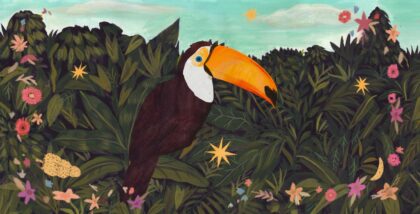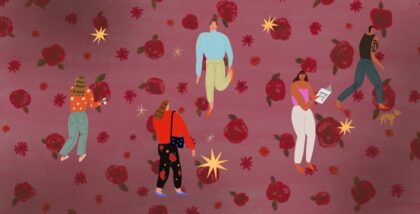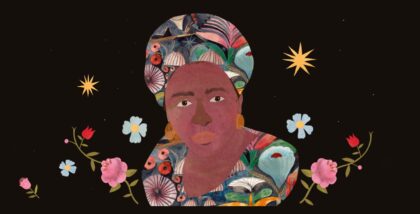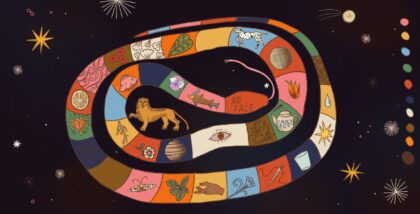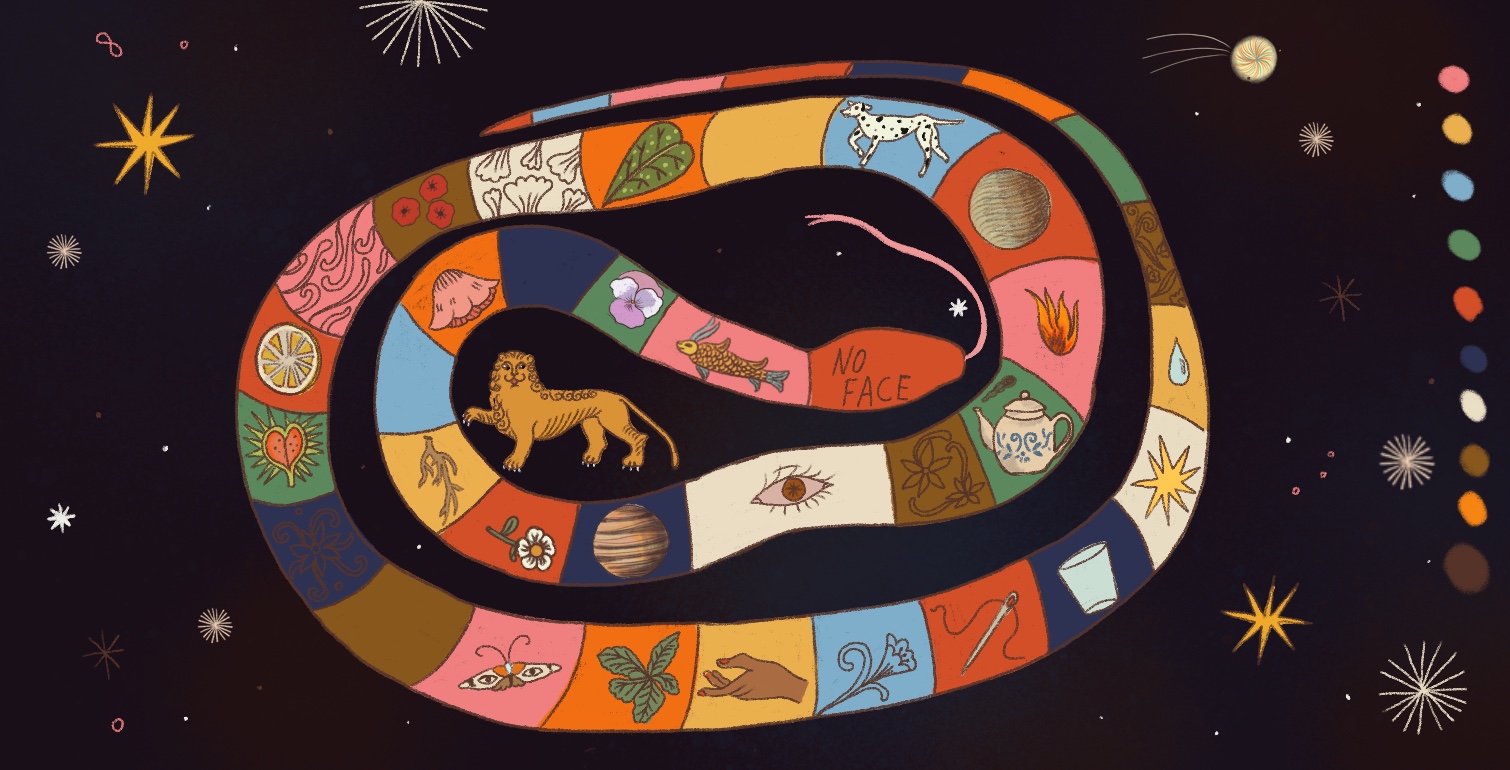
Xiaocai says there’s a woman with no face who walks our city at night. A few boys in the neighborhood claim they’ve spotted her while idling in the parking lot of the Pacific Rim strip mall, but Xiaocai says they were drunk and high and cross-eyed. This woman wears all white, a white gown and a white veil fine as fly wings, and she walks in the middle of the street on moonless nights and does nothing but wail, wail, wail.
“Oh, that’s just my aunt,” I say to Xiaocai. Because she was a daughter, my aunt was given away as a baby. She was adopted into a no-faced family. Her own face was scraped off so that she would resemble her new parents, whose features were the phases of the moon. Because she was raised facelessly, all her mirrors were undisturbed bodies of water, and her skin could absorb nutrients from light. That must have been the woman Xiaocai saw.
But Xiaocai says no, no, we don’t know this woman. Xiaocai claims she’s seen this woman in white standing at the foot of her bed at night, and that she wakes up to the sensation of water draped over her body, but it’s just the woman weeping and wailing and pissing all over her. Disgusting, we think. The woman with no face wails silently, because she doesn’t really want to disturb anybody, she just wants to tunnel deep inside the slimy nostril of night.
How does she wail if she’s got no face? How does she weep?
Xiaocai says she doesn’t know. She only knows that the woman wears a veil, thick as bad breath, and that this veil swathes her entirely, dousing her whole body like bad milk.
Does she really have no face? Or is it just that the veil covers her face?
“She’s got no face under there,” Xiaocai says, “Believe me.” But we don’t know whether to believe her, because Xiaocai also claims that she was possessed by a tiny demon the size of her thumb, and that the demon had told her to steal her mother’s wedding jewelry, which was wrapped in velvet and stored in her mother’s underwear drawer. Lin Ayi caught Xiaocai standing over the drawer in the middle of the night, her face raked blank by the glow of gold. With a shout, Lin Ayi grabbed Xiaocai by the hair and lifted her. “It was like I was made of air,” Xiaocai said to us later, “Because I didn’t feel any pain at all. I didn’t lose a single thread of hair. She lifted me weightlessly, and my hair streamed from her fingers like rain, and my body was made of nothing.”
Xiaocai claims she’s seen this woman in white standing at the foot of her bed at night, and that she wakes up to the sensation of water draped over her body.
The tiny demon had been a miniature version of the woman with no face, Xiaocai explained to us. The tiny demon was born from Xiaocai’s belly button, no bigger than a ball of lint, and she waltzed across Xiaocai’s stomach and said, “Take your mother’s wedding jewelry and leave your house with all of it. She won’t give it to you unless you get married, and I know you will never marry. So take it quickly, while she sleeps, and join me in walking. Let the night inherit your longing. Join me on the street.”
We called Xiaocai out on the inconsistencies of her story: hadn’t she said the demon was as tiny as a thumb? Why was it now as tiny as a ball of lint? Those were entirely different sizes. But Xiaocai shook her head and said, “What the demon told me was true. The demon said I would never marry, but that I needed to get out of the house and join her. I know someday I will walk with her. I know now where she is going.”
Where is she going? we asked. Without a face, how does she know where she goes?
But Xiaocai doesn’t tell us. We think the woman wears a white veil out of shame, out of grief. The other neighbors say they see her too, but only while they’re driving late at night, and they say the woman does not walk at all, she runs. She scurries down the street on her hands and knees, and Lin Ayi says she almost hit the woman with her car. “She looks like an opossum,” Lin Ayi says, “And you know how I hate opossums. They play dead in the presence of predators, instead of running away or doing something useful.” Skewered by the headlights of Lin Ayi’s car, the woman with no face had indeed played dead, rolling over onto her back and sticking her limbs into the air like golden stalks of weeds. Lin Ayi swerved to avoid her, ran up on a curb, and punctured two tires on the left side. “That ghost owes me,” Lin Ayi says, “for my two flats! You know how those mechanics like to scam!”
Xiaocai says she doesn’t worry about the woman with no face harming anyone, because it is those with human faces that we must learn to fear. She says ghosts are truly free because no one knows exactly what they’re supposed to do, so they just wander aimlessly and wail. “I miss the purposelessness of being possessed,” Xiaocai says. “It was the first time I felt I was really myself. I felt that she was merely playing with my form, doing nothing but plucking the arteries inside me until my blood was a pleasing melody. Until the music was my truest mirror.” Xiaocai dances her fingertips on our bare bellies, shoveling out balls of lint with her pinky nail. We think she is trying to excavate the tiny demon again, but she doesn’t admit it.
In the newspaper one morning, I read that the woman with no face has been spotted climbing a tree, and that this is the first time anyone has seen her move along a vertical axis. The city is alarmed at this progressive mobility and wonders if she will soon begin to trespass upon private property and scale fences that are not meant to be breached. They also report that most startlingly, the woman with no face has been seen with decorated ankles and wrists, her long earlobes ornamented in stolen gold, visible even beneath the thick haze of her veil.
Without a face, how does she know where she goes?
Even more surprising, there is now a second woman with no face who stands at the base of the tree while the demon scales the trunk, and this second woman — possibly the progeny of the first woman, no one can tell — appears to be very young, too young to be wandering away from home in the middle of the night, too young to understand what it means to replace one’s body with a place. The ghosts reach up toward the sky, clawing the scalp of the moon until it is mangled, scabs crusting over its craters. Perhaps they are punishing the moon for having a face. If you see either of these women with no faces, you are to avoid them at all costs.
Everyone knows that a ghost exists to possess other bodies, to live vicariously and viciously through the flesh of others, to find a surrogate through which to birth wickedness. Xiaocai says we shouldn’t be afraid of these new reports, that they’re just fear-mongrelizing. “Don’t you mean fear-mongering?” we ask. “No,” she says, “fear-mongrelizing. Breeding and butchering fear. The thing is,” Xiaocai says, “isn’t every woman we know in the possession of someone else? Aren’t we meant to live through the bodies of our husbands and our babies and our sea-bound feces? Our breath-powered fancies, the ones we don in our dreams and shed in the mornings? What is there to fear?” Even our most precious belongings are given to us under the condition that we must first belong to someone else.
There is another rumor that we ignore. Some people say that the woman with no face has recently taken up residence in the downstairs girls’ bathroom at school, and that she sleeps inside the metal mailbox screwed into the green wall of the stall, the box where you’re supposed to discard your tampons. But no one ever empties out or cleans that box, and it is so crusty and rusty that we’re afraid to open the lid: inside is a crumpled paper bag that’s forfeited its basic purpose, along with a larval colony of tampons that has incubated so long in the dark it can travel the night as a single winged mass from the gelatinous past.
“She must go home to somebody,” we say, “how else did she get her gold?” But Xiaocai shakes her head and says, the woman with no face has inherited nothing, not even a nose. Her features are copied from skies, distant hillsides, and root vegetables. Blank things, eaten things. Nothing you can criticize.
The box is the perfect place to sleep if you never want to be disturbed, and some of us think the woman with no face is secretly a genius. Others of us think that she lacks personal hygiene. Xiaocai says I shouldn’t believe the rumors, since the woman with no face doesn’t sleep at all. Night is when she’s most alive, when she makes her own light, her gold bracelets and rings strung together by the lineage of her limbs, dazzling all the local owls and raccoons.
Even our most precious belongings are given to us under the condition that we must first belong to someone else.
One night, unable to sleep, I scale the fence between our two yards. I enter Xiaocai’s bedroom through a sliding door, wriggling in through a hole in the insect screen, and stand by the foot of her bed. I just stand there, breathing for a few moments, wondering why demons don’t hatch from my itchy belly button, which accumulates so much more fiber and dust than Xiaocai’s because I never clean it out properly. I foster filth in the dish of my skin, praying that I, too, cultivate a mystery. Then I remember the night she described, the night the woman with no face came to her side and told her to steal from her mother, and I step forward to stand beside her pillow. Her cotton blanket fits her as snugly as a saddle. It’s pulled all the way over her head, hardening into a chrysalis.
I scrape the blanket back, snagging a few strands of Xiaocai’s long hair, silver in the slanted moonlight. Xiaocai’s face reveals itself inch by inch, a blank scroll of skin. There is not a feature stitched to it. No mouth, no eyes, no nose. No moles. No asymmetrical dimples, one deeper than the other, empty graves dug for the daylight. And yet I can still hear her breathing, her chest cresting and caving, blood climbing in and out of all her crevices. Around her wrists are cuffs of gold, wet and pulsing like flayed flesh. I cover her with the blanket, shrouding her like the dead.
I sit vigil with her all night, telling myself that I am protecting her from demons as tiny as lint balls, protecting her from the ghosts that would charge headlong into her heart, but in truth, I am waiting for her to stand up and leave. I am waiting for Xiaocai to take me with her, to tell me how and why she goes where she goes. Tell me, I whisper, where is that other world, that ghostworld where you roam, where you are identified only as moonlight, taking the face of anything you touch?
At her bedside, I claw at my own face. I try to make myself blank. But morning arrives before I can shred my expression into ribbons of wet tendon, before I can learn to walk alone in the darkness. In the cavern of her blanket, Xiaocai’s head rotates like a globe. Her face is the face of a planet, visible only from a distance. I am too small to see it. I stand on it, I walk on it, but I will never see the entirety of its surface, its silver seas, the contours of its coasts. I will never live anywhere but here.
